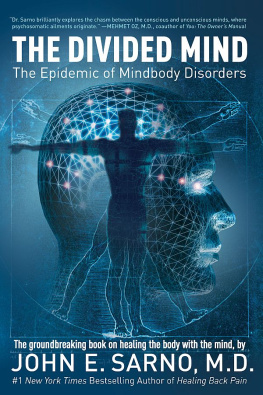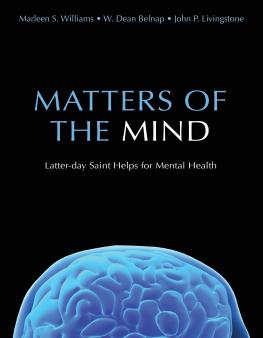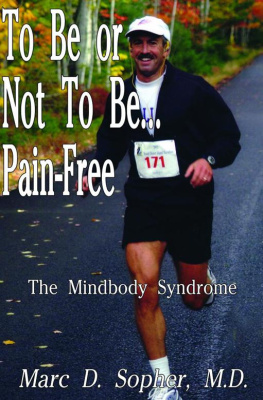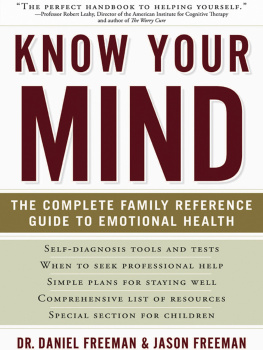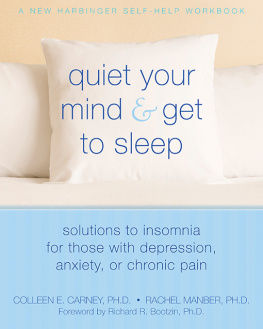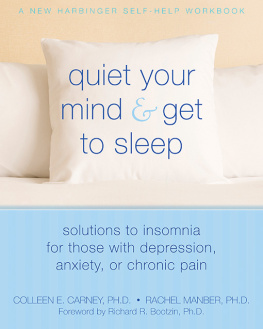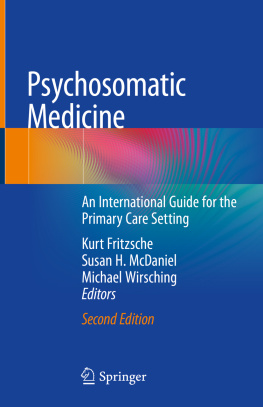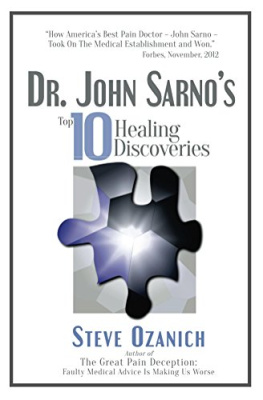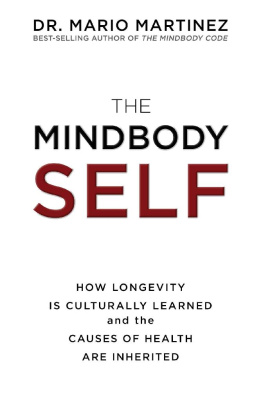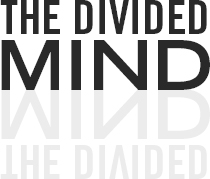
Also by John E. Sarno, M.D.:
Mind Over Back Pain: A Radically New Approach to the Diagnosis and Treatment of Back Pain
The Mindbody Prescription: Healing the Body, Healing the Pain
Healing Back Pain: The Mind-Body Connection
Stroke: The Condition and the Patient
coauthored with Martha Taylor Sarno
Stroke: A Guide for Patients and Their Families
coauthored with Martha Taylor Sarno
JOHN E. SARNO, M.D.
WITH CONTRIBUTIONS FROM SAMUEL J. MANN, M.D., IRA RASHBAUM, M.D., ANDREA LEONARD-SEGAL, M.D., JAMES R. ROCHELLE, M.D., DOUGLAS HOFFMAN, M.D., AND MARC SOPHER, M.D.

This ebook version 2011
First published in the UK in 2008 by
Duckworth Overlook
90-93 Cowcross Street
London EC1M 6BF
Tel: 020 7490 7300
Fax: 020 7490 0080
info@duckworth-publishers.co.uk
www.ducknet.co.uk
First published in the USA in 2006 by
HarperCollins Publishers.
2006 by John E. Sarno
The right of John E. Sarno to be identified as the Author of the Work has been asserted by him in accordance with the Copyright, Designs and Patents Act 1988.
All rights reserved. No part of this publication may be reproduced, stored in a retrieval system, or transmitted, in any form or by any means, electronic, mechanical, photocopying, recording or otherwise, without the prior permission of the publisher.
A catalogue record for this book is available from the British Library.
ebook ISBNs:
Mobipocket 978-0-7156-4205-4
ePub 978-0-7156-4206-1
Adobe PDF 978-0-7156-4207-8
Grateful acknowledgment is made for permission to print the following material:
Hypertension and the Mindbody Connection: A New Paradigm
Samuel J. Mann, M.D. Used by permission of the author.
My Experience with Tension Myositis Syndrome
Ira Rashbaum, M.D. Used by permission of the author.
A Rheumatologists Experience with Psychosomatic Disorders
Andrea Leonard-Segal, M.D. Used by permission of the author.
My Perspective on Psychosomatic Medicine
James R. Rochelle, M.D. Used by permission of the author.
Structural Pain or Psychosomatic Pain?
Douglas Hoffman, M.D. Used by permission of the author.
A Family Doctors Experience with Mindbody Medicine
Marc Sopher, M.D. Used by permission of the author.
This book contains advice and information relating to health care. It is not intended to replace medical advice and should be used to supplement rather than replace regular care by your doctor. It is recommended that you seek your physicians advice before embarking on any medical program or treatment. All efforts have been made to assure the accuracy of the information contained in this book as of the date of publication. The publisher and the author disclaim liability for any medical outcomes that may occur as a result of applying the methods suggested in this book.
INTRODUCTION
Health care in America is in a state of crisis. Certain segments of American medicine have been transformed into a dysfunctional nightmare of irresponsible practices, dangerous procedures, bureaucratic regulations, and skyrocketing costs. Instead of healing people, the broken health care system is prolonging peoples suffering in too many cases. Instead of preventing epidemics, it is generating them.
Does this judgment sound too harsh? Lets look at some statistics. Over six million Americans suffering from the mysterious and excruciatingly painful ailment called fibromyalgia are being treated by an army of self-minted specialists, not one of whom has a clue as to what causes the disorder. Millions more are suddenly being treated for gastric reflux, at an annual cost of billions of dollars. Who says heartburn cant be profitable? And millions moremany of them youngstersare dependent on mind-altering drugs which, it now turns out, may actually be endangering their lives.
The circumstances are serious. I am not overstating the situation. Thats why my colleagues and I have written this book.
The Divided Mind is about the principles and practice of psychosomatic medicine. It is not about alternative medicine, or some trendy New Age regimen. It is about straightforward, clinically tested medicine, as practiced by licensed physicians for over thirty years, working with thousands of patients.
First, I want to clear up any confusion surrounding the word psychosomatic. You may think it refers to something vaguely fraudulent, such as imaginary diseases dreamed up by people for their own selfish or confused reasons. Thats simply not true. But even medical practitioners, doctors who might be expected to have a more accurate understanding of the term, sometimes make the mistake of assuming it refers to how stress makes disease worse, or the stressful consequences of living with a disease. Those are legitimate concerns and have been addressed in the medical literature, but they are not psychosomatic. Psychosomatic medicine specifically refers to physical disorders of the mindbody, disorders that may appear to be purely physical, but which have their origin in unconscious emotions, a very different and extremely important medical matter. Note that we will use the terms psychosomatic and mindbody interchangeably throughout the book, so dont let it throw you.
There are literally hundreds of disorders and illnesses that have been identified as purely psychosomatic or having a psychosomatic component. We will explore many of them in the pages that follow. They can range from mildly bothersome back pain all the way to cancer, depending on the power and importance of unconscious emotional phenomena. Psychosomatic illnesses seem to be an inescapable part of the human condition. Yet amazingly, in spite of the nearly universal prevalence of such disorders, the practice of psychosomatic medicine is almost totally unknown within todays medical community, and plays virtually no part in contemporary medical study and research. Nowadays, when physicians and many psychiatrists are confronted with a psychosomatic disorder, they do not recognize it for what it is and almost invariably treat the symptom.
The enormity of this miscarriage of medical practice may be compared to what would exist if medicine refused to acknowledge the existence of bacteria and viruses. Perhaps the most heinous manifestation of this scientific medievalism has been the elimination of the term psychosomatic from recent editions of the Diagnostic and Statistical Manual of Mental Disorders (DSM), the official publication of the American Psychiatric Association. One might as well eliminate the word infection from medical dictionaries.
This astonishing state of affairsscandalous reallydid not occur overnight. For the first half of the twentieth century the study and treatment of psychosomatic disorders was recognized by many medical professionals as a promising and important new frontier of medicine. Then, about fifty years ago, the American medical community took a wrong turn and simply abandoned its interest in psychosomatic medicine. I shall speculate on why this happened, but for now the important thing to note is that as a direct result of turning its back on this vital branch of medicine, the medical profession has helped to spawn epidemics of pain and other common disorders affecting the lives of millions of Americans.
Next page
